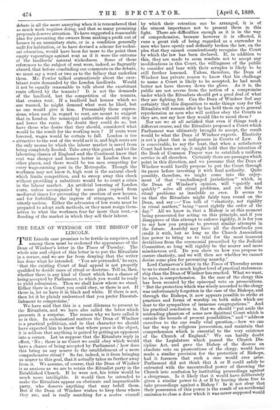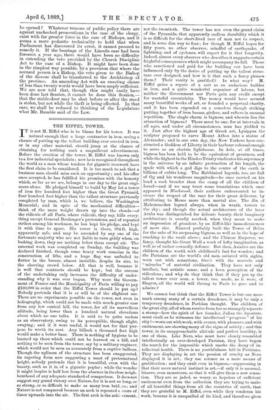THE DEAN OF WINDSOR ON THE BISHOP OF LINCOLN. T HE
Lincoln case promises to be fertile in surprises, and among them must be reckoned the appearance of the Dean of Windsor's letter in the Times of Tuesday. The whole aim and object of this letter is to put the Ritualists in a corner, and we are far from denying that the writer has done what he intended. You are persuaded,' he says, that the existing Court of final appeal is not properly qualified to decide cases of ritual or doctrine. Tell us, then, whether there is any kind of Court which has a chance of being accepted by Parliament, to which you would be ready to yield submission. Then we shall know where we stand. Either there is a Court you could obey, or there is not. If there is, let us have it in black and white. If there is not, then let it be plainly understood that you prefer Disestab- lishment to compromise.'
We have said that this is a neat dilemma to present to the Ritualists, and we have also called the letter which presents it a surprise. The reason why we have called it so is this. In ecclesiastical matters the Dean of Windsor is a practical politician, and in that character we should have expected him to know that where peace is the object, it is seldom that anything is gained by getting an opponent into a corner. Let us suppose that the Ritualists reply in effect, No ; there is no Court we could obey which would have a chance of being accepted by Parliament ;' how does this bring us any nearer to the establishment of a more comprehensive ritual ? So far, indeed, is it from bringing us nearer to this goal, that it actually takes us further away from it. We assume, of course, that the Dean of Windsor is as anxious as we are to retain the Ritualist party in the Established Church. If he were not, his letter would be much more intelligible. It would then be intended to make the Ritualists appear an obstinate and impracticable party, who deserve anything that may befall them. But if the Dean of Windsor wishes to keep them where they are, and is really searching for a modus vivendi by which their retention can be arranged, it is of the utmost importance not to present them in this light. There are difficulties enough as it is in the way of comprehension, because however it is effected, it runs a great risk of being regarded as a surrender to men who have openly and defiantly broken the law, on the plea that they cannot conscientiously recognise the Court by which the law has been declared. If, in addition to this, they are made to seem resolute not to accept any modifications in this Court, the willingness of the public to consider and bear with their scruples is likely to be still further lessened. Unless, therefore, the Dean of Windsor has private reason to know that his challenge to name a Court is likely to be accepted, he had much better not have thrown down the glove. As it is, the public are not averse from the notion of a compromise under which the Ritualists should get a good deal of what they are fighting for. Can the Dean of Windsor feel any certainty that this disposition to make things easy for the Ritualists will remain after he has held them up to general reprehension as men who will neither obey the Courts as they are, nor say how they would like to mend them ? Nor are we at all satisfied that even if things took a different course, and the Ritualists proposed a Court which Parliament was ultimately brought to accept, the result would be what the Dean of Windsor expects. Elasticity is not% plant that is indigenous in Courts of Law. It is conceivable, to say the least, that when a satisfactory Court had been set up, it might hold that the intention of the Book of Common Prayer was to establish a uniform service in all churches. Certainly there are passages which point in this direction, and we presume that the Dean of Windsor would hardly propose to put the Court through its paces before investing it with final authority. Quite possibly, therefore, we might come into the enjoy- ment of that " unchallenged jurisdiction " which, in the Dean of Windsor's opinion, will " quietly and quickly" solve all ritual problems, and yet find the ritual problems as insoluble as ever. It seems to us that the Ritualists might fairly turn round on the Dean, and say You talk of " elasticity, not rigidity in ritual matters," being "most rightly the order of the day." All we know is, that a Bishop is at this moment being prosecuted for acting on this principle, and if you disapprove of this attempt to enforce rigidity, it is for you to say how you propose to prevent similar attempts in the future. Anarchy may have all the drawbacks you credit it with, but so long as the Church Association has power to bring us to trial for the most innocent deviations from the ceremonial prescribed by the Judicial Committee, so long will rigidity be the nearer and more mischievous evil. Do you show us how you propose to ensure elasticity, and we will then see whether we cannot devise some plan for preventing anarchy.'
Lord Carnarvon's letter in the Times of Thursday seems to us to stand on a much higher level of practical statesman- ship than the Dean of Windsor has reached. What we want, he says, is comprehension. In the case of the clergy this has been secured by the episcopal veto on prosecutions. " But the protection which was wisely accorded to the clergy was unfortunately forgotten in the case of the Bishops, and through the Bishops, it now appears possible to strike at practices and forms of worship on both sides which are dear to the sympathies of immense congregations." And his practical conclusion is, that we should " put aside the misleading phantom of some new Spiritual Court which is outside the bounds of present possibilities," and " address ourselves to the one really vital question,—how we can bar the way to religious persecution, and maintain that comprehension which is essential to the very existence of the Church of England." We can hardly doubt that the Legislature which passed the Church Dis- cipline Act, and gave the Bishop of the diocese an absolute veto on prosecutions of the clergy, would have made a similar provision for the protection of Bishops, had it foreseen that such a case would ever arise. Parliament did not think that A or B could safely be entrusted with the uncontrolled power of throwing the Church into confusion by instituting proceedings against a clergyman. Is it likely that it would have deliberately given a similar power to A or B by leaving them free to take proceedings against a Bishop ? Is it not clear that their possession of this power is the result of an accidental omission to close a door which it was never supposed would
be opened ? Whatever *reasons of public policy there are against unchecked prosecutions in the case of the clergy, exist with far greater force in the case of Bishops, and it seems a mere pedantic technicality to hold that when Parliament has discovered its error, it cannot proceed to remedy it. If the bearings of the Lincoln case had been foreseen a year ago, there would have been no difficulty in extending the veto provided by the Church Discipline Act to the case of a Bishop. It might have been done in the simplest way possible, by a provision that where the accused person is a Bishop, the veto given to the Bishop of the diocese shall be transferred to the Archbishop of the province. An amending Act with an enacting clause of less than twenty words would have been amply sufficient. We are now told that, though this might easily have been done last Session, it cannot be done this Session,— that the stable-door may be shut before or after the steed is stolen, but not while the theft is being effected. In that case, we shall be reduced to thinking of the Legislature what Mr. Bumble said of the Law.



































 Previous page
Previous page